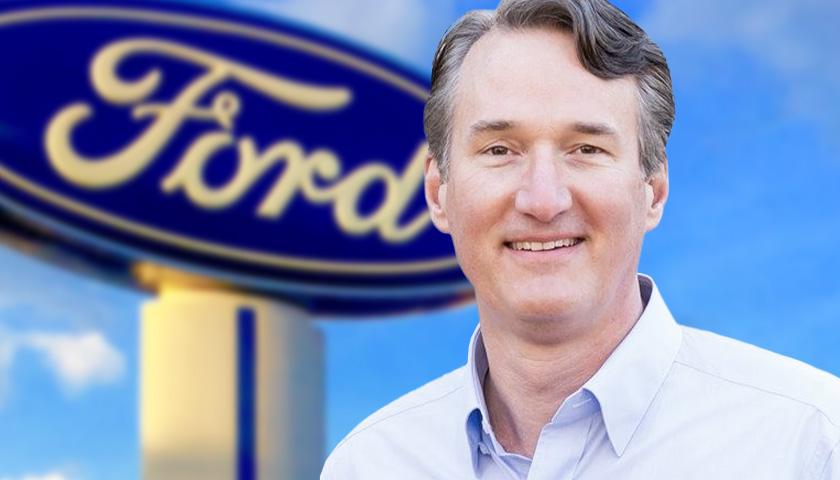Governor Glenn Youngkin blocked Virginia from consideration for a battery plant to supply Ford Motor Company amid concerns about the technology supplied by a Chinese company, he told reporters on Wednesday.
In a press gaggle, Youngkin criticized a clean energy push that relied on technology “owned and dominated by the Chinese.”
“Well, we in fact felt that the recent efforts to put forward a Ford plant that would house Chinese technology to build the batteries was in fact representative of that. And that we felt the right thing to do was to not recruit Ford as a front for China to America. Let’s develop our own technology,” Youngkin said after his State of the Commonwealth speech.
Youngkin’s comments came after an anonymous source gave an exclusive to The Daily Caller in December.
“The governor has directed the Virginia Economic Development Partnership (VEDP) to remove Virginia from consideration for this project and not to submit an incentive package,” the source said, according to The Caller. “Ultimately, Virginia is removing itself from any possibilities of the CATL [Contemporary Amperex Technology Co. Ltd] plant being established due to concerns surrounding the deal.”
During his Wednesday speech, Youngkin highlighted several concerns related to China, including calls for legislators to ban social media from selling data from minors, and to ban selling farmland to entities linked to the Communist Party of China. Youngkin also highlighted major economic development wins for Virginia, including Boeing and Raytheon’s relocations to the Commonwealth.
The former CEO has made economic development a regular source of news from his office, and his budget proposal for the upcoming legislative session includes a push to make Virginia more attractive to outside businesses, with items including a cut to the business tax rate. Additionally, Youngkin’s rejection of the battery plant comes as Georgia Governor Brian Kemp has announced major electric automotive manufacturing expansions from Korean brands Hyundai and Kia; Georgia is one of the southern states Youngkin has designated as benchmarks for economic performance.
At the gaggle, reporters asked about Youngkin’s policy on investments with China while he was co-CEO of Carlyle.
“I think I’m uniquely positioned to understand how the Chinese Communist Party works. I dealt with them,” Youngkin said. “I’ve dealt with them, and I understand what they’re doing. They have one objective: global dominance at the expense of the United States.”
Senator Jennifer McClellan (D-Richmond) said Wednesday that Youngkin’s comments on China sounded like talking points for a potential presidential run.
Responding to news about Youngkin’s rejection of the battery plant, Senator Scott Surovell (D-Fairfax) tweeted, “Glenn Youngkin’s race to match Ron DeSantis anti-China crusade just cost Virginia potential advanced manufacturing jobs.”
– – –
Eric Burk is a reporter at The Virginia Star and The Star News Network. Email tips to [email protected].
Photo “Glenn Youngkin” by Glenn Youngkin. Background Photo “Ford” by Mike Mozart. CC BY 2.0.






You mean the Chinese that are going to profit hugely from the Ford battery plant so exuberantly pushed by the governor of Tennessee and its legislature to the point of providing a $1,000,000,000 incentive? The governor should be ridden out of town on a rail.
Not all that glitters is gold, is the old saying. Governor Youngkin is a ‘pretty smart’ fellow (i.e., a many times over multi-millionaire financier). So, Virginia has rejected having its own Blue Oval City, huh? Making automobile batteries seems to me to be potentially a very environmentally hazardous activity. I assume that the costs attendant to a ‘clean-up’ of such environmental hazards if something ‘goes horribly wrong’ will be unimaginably expensive. So, what happens if the manufacture of electric vehicles proves to be a ‘bust’ (i.e., premature)? Will Ford Motor Company be able to just ‘walk away’ and leave to the citizens of the State of Tennessee to pay for the cost of the ‘clean up’ of the environmental damage it may have caused (i.e., even the partial cost of an environmental disaster ‘clean up’ could be massive). I know from experience (i.e., having once been an environmental attorney myself for the State of Tennessee many years ago) that after a business project ‘goes bad’ and environmental damage has been done, money will only go so far in rectifying the problem. Once done, environmental damage to land often remains forever. Virginia just opted out of the financially temptation cooed to it by Ford, saying: No thanks!